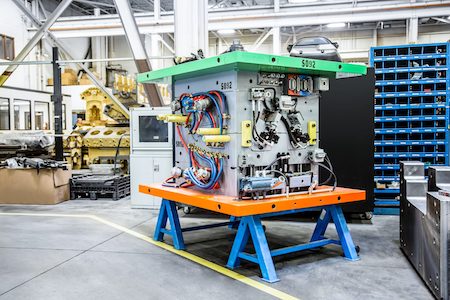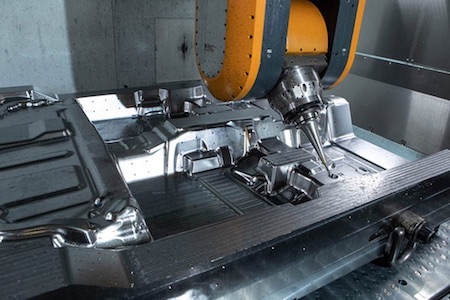Compression Molding vs. Injection Molding
Leave a Comment
Compression Molding vs. Injection Molding
Compression molding and injection molding are both efficient, cost-effective, and versatile methods of fabricating high-quality components. While they have similarities, the two types of molding each provide unique benefits. The following guide offers a basic overview of both methods, as well as some guidance about which method to use for large components.
What Is Injection Molding?
 Injection molding is ideal for creating complex, intricate parts and large production runs. To fabricate a component using injection molding, a manufacturer will first create a steel mold based off the user’s product design. After the mold is created, the manufacturer injects a melted plastic formula into the mold, where it will cool and set in the shape of the mold’s cavities.
Injection molding is ideal for creating complex, intricate parts and large production runs. To fabricate a component using injection molding, a manufacturer will first create a steel mold based off the user’s product design. After the mold is created, the manufacturer injects a melted plastic formula into the mold, where it will cool and set in the shape of the mold’s cavities.
This production method offers several advantages, including an exceptional level of consistency, versatility and a high level of accuracy. The process can be easily replicated for large production runs, and molds can be customized to nearly any shape.
Here are some examples of components that are commonly made using injection molding:
- Dashboard components, center consoles, door applications
- Medical parts
- Vehicle fascias
- Appliance components
Large Injection Mold Services
What Is Compression Molding?
Rather than use melted plastic to fill the cavities of the mold, the compression molding method involves pouring or placing thermoset materials into a heated mold cavity. The mold is then compressed under heavy pressure, forcing the material to spread throughout the mold. To ensure proper curing, compression molds must be kept at a stable pressure and temperature.
Compression molding can be slightly less consistent than injection molding and is better suited for less complex components. While both types of molding can yield high-volume output, compression molding is more affordable for building simple components that are strong and durable. Another advantage of compression molding is the ability to produce extra-large parts at lower cost.
Common applications of compression molding include:
- Automotive acoustic parts
- Body armor
- Encapsulating electronic components
- Circuit Breakers
Large Compression Tooling Services
Materials
If you’re deciding between compression or injection molding, consider the type of material you plan to use.
The following thermoset materials generally work best with compression molding:
- Bulk molding compound (BMC)
- Sheet molding compound (SMC)
- Diallyl phthalate (DAP)
- Epoxy
- Phenolics
- Silicone
- Thermoset polyester
- Shoddy pad
- RUS underbodies
- Vinyl ester
Injection molding, on the other hand, works best with the following materials:
- Acrylonitrile butadiene styrene (ABS)
- Polystyrene
- Polypropylene
- Polycarbonate
- Polyethylene
- Nylon
Should You Use Compression or Injection Molding for Large Components?
If you’re manufacturing large components, both injection and compression molding provide many advantages.
Large component injection molds are ideal for manufacturing:
- Thermoplastic materials
- Complex parts
- Components requiring a high degree of consistency
Large component compression molds are commonly used with:
- Thermoset materials
- High-volume output
- Components requiring a high degree of strength and durability
Ultimately, choosing the right method comes down to the material and the product’s intended application.
No matter which process you use, it’s vital to work with professionally designed molds. A tooling partner can ensure you receive the most efficient and accurate solution using their expertise and cutting-edge equipment.
Contact Reko Tool & Mold for Large Injection and Compression Molds
At Reko Tool & Mold, our team of toolmakers uses the latest techniques to design and manufacture injection and compression molds that are second to none. Our injection molds run in presses ranging from 750T to 4400T, and we specialize in Class-A surface parts for automotive or truck interiors and compression molds for acoustics. We offer large-scale tooling, including full-floor molds, and operate large machining envelopes for commercial and industrial projects. In addition, we provide mold repair and support services for large scale molding.
For over 40 years, Reko Tool & Mold has provided molds for a broad array of industries and organizations that operate large machinery and need components built with precision and strength. To learn more about how we can serve your next project, contact us today.





